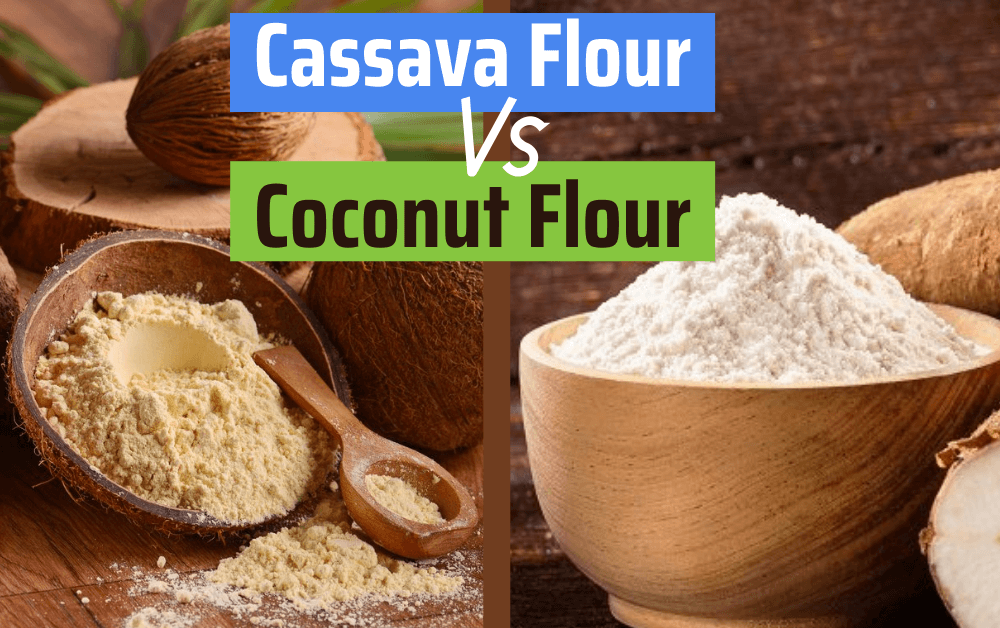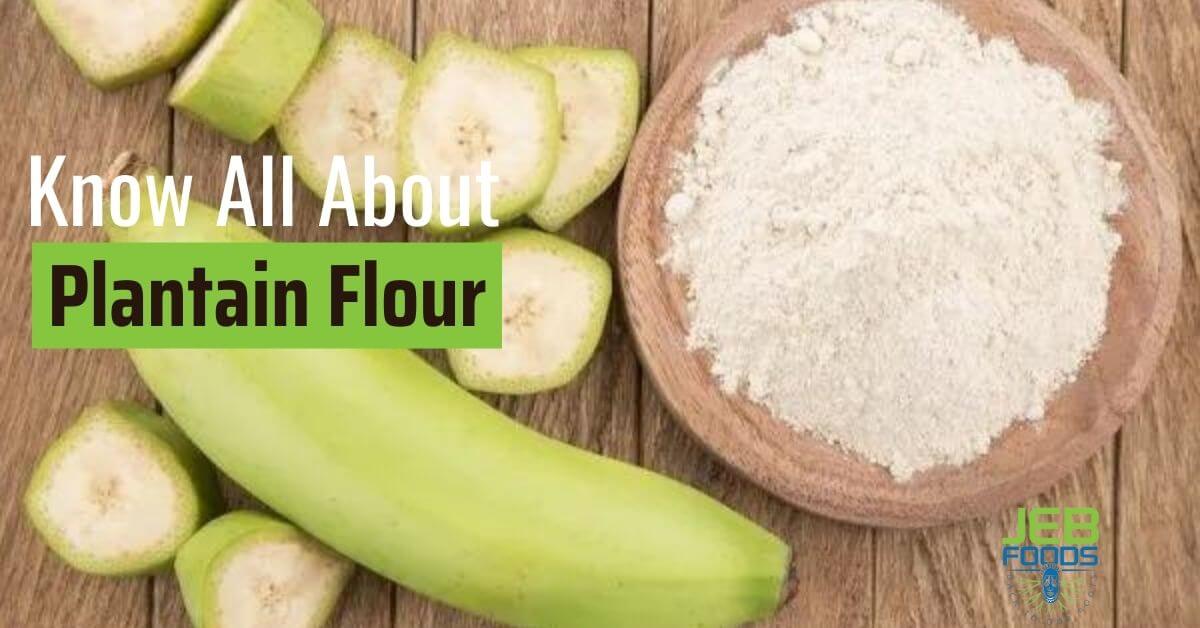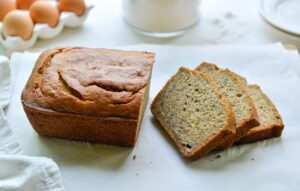I will be comparing Cassava Flour Vs Coconut Flour based on which one is best, why it is a preferred choice and at which condition for baking
The increased understanding of the significance of gluten sensitivity and gut health has resulted in the necessity to adopt a healthy lifestyle that is Gluten-free.
Gluten-free flour has become a household name as alternatives to wheat-based flour.
My comparison of cassava flour and coconut flour in this article will be concentrating on the similarities, differences, pros, and cons.
You can also see Wheat Flour compared to Cassava Flour
Where do these flours come from
Table of Contents
ToggleAll gluten-containing grains should be avoided by people with celiac disease, gluten sensitivity, or a wheat allergy.
In contrast, those with milder gluten sensitivity can either reduce or eliminate this protein from their diet.
Cassava flour is processed from a root vegetable (cassava tubers) rich in fiber and carbohydrates.
Coconut flour finely ground from the dried coconut meat is relatively low in carbohydrates and protein, and fiber.
Both flours popular alternatives to regular all-purpose wheat-based flour.
Similarities of Cassava Flour and Coconut Flour
Cassava and coconut flour are both gluten-free, nut-free, and paleo-friendly flours
Cassava and coconut flour are both versatile flours. Both popular alternatives to regular flour are finely ground and have unique tastes, especially for a specific recipe.
Both are high in fire content, especially coconut flour that makes it so filling. They are both rich in texture and natural sweetness, making them great for baking grain-restrictive diets, including the Paleo diet for those who follow these diets.
In appearance, they both look like wheat flour in appearance, but neither smells, tastes, nor acts like wheat flour when baking with it and they contain potent antioxidant and anti-inflammatory nutrients.

Differences Between Cassava Flour And Coconut Flour
Cassava flour is high in carbohydrate and vitamin C content, while Coconut flour is relatively low in carbohydrates and high in protein.
Single serving size of two tablespoons provides 5 grams of fiber, 3 grams of protein, and 1.5 grams of fat.
Cassava flour is rich in vitamin C, with almost the recommended daily requirement in a 100g serving.
At the same time, coconut has very little vitamin C content. Still, it is exceptionally rich in manganese; Manganese is an essential nutrient required for numerous processes and activities in the body.
It promotes bone health and aids your body’s use of other nutrients such as choline, which cassava flour also contains.
Cassava flour can be substituted with wheat flour in a 1:1 ratio as it’s the most similar in composition and texture to this all-purpose flour. In contrast, In recipes, coconut flour cannot be substituted with other flours in a 1:1 ratio (i.e., You cannot swap 1 cup. of coconut flour for 1 cup. wheat flour.)
Let’s see the nutritional facts of both flours;
| Energy per 20g serving : | CASSAVA FLOUR | COCONUT FLOUR |
| Calories / Kilocalories | 71.6 Cal / kcal | 480 kcal per cup (112 g) serving |
| Nutrients : | Per 1/8 cup (30ml) | Per 1/4-cup (30ml) |
| Energy | 231.7kJ (55.4Cal) | 120 |
| Protein | 0.03g | 6 g |
| Fat Total | 0.003g | 4 g |
| – saturated | 0.001g | |
| – trans fat | 0g | |
| – polyunsaturated fat | 0.001g | |
| – monounsaturated fat | 0.001g | |
| Cholesterol | 0 mg | |
| Total Carbohydrate | 13.72g | 18 g |
| Sugars | 0.52g | 6 g |
| Water | 1.7g | |
| Ash | 0.02g | |
| Dietary Fiber | 0.1g | 10 g |
| Selenium, Se | 0.1 µg (microgram) | |
| Sodium, Na | 0.18 mg | 239.7 mg |
| Potassium, K | 2 mg | 141.75 mg |
| Magnesium, Mg | 0.18 mg | 23.5225 mg |
| Phosphorus, P | 1 mg | 53.75 mg |
| Zinc, Zn | 0.02 mg | 0.5225 mg |
| Calcium, Ca | 3 mg | |
| Iron, Fe | 0.24 mg | 0.36 mg |
| Copper, Cu | 0.003 mg | 0.2075 mg |
| Manganese, Mn | 0.017 mg | 0.7175 mg |
| Vitamin B6 | 0.001 mg | |
| Foliate – total | 1 µg (microgram) | |
| Choline – total | 0.2 mg | 5.7675 mg |
| Pantothenic acid | 0.021 mg | 0.21 mg |
| Aspartic acid | 0.002 mg | |
| Glutamic acid | 0.004 mg | |
| Selenium, Se (mcg) | 4.8175 mcg | |
| Vitamin E (alpha-tocopherol) (mg) | 0.0275 mg | |
| Vitamin C, total ascorbic acid (mg) | 42.4 mg | |
| Thiamin (mg) | 0.087 mg | 0.015 mg |
| Riboflavin (mg) | 0.048 mg | 0.025 mg |
| Niacin (mg) | 0.854 mg | 0.1575 mg |
| Pantothenic acid (mg) | 0.21 mg | |
| Folate, total (mcg) | 2.24 mcg | |
| Vitamin K | 0.0275 mg |
*These Percent Daily Values are based on a 2,000-calorie diet; your values may differ depending on your calorie requirements.
Compared to other gluten-free flours such as coconut or almond, cassava flour has a low-fat content.
It has higher water content and a lower calorie density than flours like corn, plantain, rice, coconut, sorghum, and wheat.
Cassava flour functions well when mixed with other nutrient-dense meals to increase fiber, vitamins, and minerals.
I made a comparison of gluten-free flour vs Whole flour as well, check it out.
How does Cassava Flour Compare to Coconut Flour In terms of Toxicity
Cassava contains cyanide, a poisonous substance in its raw form. During cassava flour production, all the cyanide content is rid of, making it very safe for consumption.
The primary disadvantage to Coconut Flour is Salicylates, which are a class of chemical compounds found in a variety of plant diets.
One of the most abundant sources of these chemicals is coconut, and coconut flour, produced from pure coconut meat, is high in salicylates.
Salicylate intolerance/sensitivity affects many people. While the majority of people have no difficulty with modest salicylate intake, others do.
Salicylate-containing foods may induce gastrointestinal and respiratory problems in such persons.
Before using coconut flour, those sensitive to salicylates should consult with their doctor or a nutritionist.
There are numerous possible disadvantages to using coconut flour that should be considered. Some people get bloating when they consume coconut flour. It’s high in fiber, which may feed all kinds of intestinal bacteria–both healthy and harmful.
Believe it or not, over-feeding beneficial bacteria can also cause intestinal problems! In the end, digestive abnormalities damage the immune system (the gut is the basis of your immune system).
Because coconut flour is mainly fiber, some individuals believe it might irritate the gut if consumed excessively or regularly.
How Does Cassava Flour Compare Calories to coconut Flour
120 grams of Coconut Flour have 514 calories. With 429 calories per 100 grams, this food would be considered a high-calorie density food.
Be Aware, Foods having a high-calorie density tend to accumulate calories rapidly, and those attempting to lose weight should be cautious with their portion sizes.
How Does Cassava Flour Fare Against Coconut Flour In Terms Of Health Benefits
| Type of Flour | Total Carbohydrate | Fiber Content |
| Cassava flour | 89g | 6g |
| Coconut Flour | 57.14 g | 35.71 g |
| Almond Flour | 21.43 g | 10.7 g |
| Wheat Flour | 72.53 g | 2.4 g |
The fiber content of food can help slow the digestion of the carbohydrates into glucose, thereby lowering postprandial (after meal) blood sugar levels.
As a result, coconut flour is a superior option to cassava flour for people who want to keep their blood sugar levels constant.
The glycemic index of coconut flour is lower than that of most standard gluten-free flour. Coconut flour is a low-glycemic index alternative for wheat flour that is suitable for people with diabetes.
Additionally, coconut flour is naturally gluten-free and high in protein and fat, appealing to many people.
Because coconut flour is so thick, it works well as a thickening in soups and sauces.
Along with more eggs, coconut flour necessitates additional liquids in general (milk, lemon juice, apple cider vinegar, etc.).
How Does Cassava Flour Compare to Coconut Flour in Water Absorption
Coconut flour is very dense. It absorbs a lot of liquids. So for each portion of coconut flour you use, you will need to add equal amounts of liquid (water, coconut oil/butter, coconut milk, raw milk, etc.).
So if you use 1/4 cup coconut flour, you will need to add 1/4 cup of liquids or a combination of liquid.
For cassava flour, we have 60% water absorption meaning 60 lbs of water is used to hydrate 100 lbs of flour, which means that the best gluten-free flour based on water absorption is Cassava flour.
Cassava flour may be substituted 1:1 for wheat flour due to its comparable texture and grain size. However, you will need around three or four times the amount of cassava flour like coconut flour.
Additionally, you will need to decrease the amount of liquid in the recipe, as coconut flour is far more absorbent than cassava flour.
How Does Cassava Flour Compare In Usability To coconut Flour
Coconut flour can be challenging to use in baking. So here’s what you need to know.
Dough made with coconut flour needs to be mixed longer, and it differs in mixing time depending on nixing alternatives.
Cassava flour is less dense than coconut flour, so you’ll need to use more of it than you would coconut flour because cassava flour is less absorbent than coconut flour.
The general advice is to use roughly four times more cassava flour than coconut flour. It will account for the difference in density and absorbency.
Coconut flour is exceptionally absorbent, and a minimal amount of flour will absorb a considerable amount of liquid. Foods cooked with it frequently have a gritty texture, it’s essential to sift the flour before baking with it properly.
Assume you dislike the flavor of coconut. In such a scenario, baking with coconut flour may not be the ideal option until combined with another strong flavor (such as chocolate, onion, or garlic), as it has a unique coconut taste.
Coconut flour is a dehydrated form of coconut. To compensate for the dryness of coconut flour, you’ll want to use lots of eggs and other high-moisture ingredients such as cooked, pureed, or mashed fruit and vegetables.
Coconut flour alone is ineffective in recipes that call for a crispy texture (i.e., crispy cookies or crackers).
It assists in compensating for the absence of gluten; recipes usually incorporate some additional protein (hemp protein powder tends to work well).
To prevent moisture from getting into the coconut flour, store it in an airtight container or freeze it.
When using coconut flour in baked products, eggs are almost always required.
Additionally, coconut flour takes more eggs than regular flour does. This is because eggs serve as the primary binding agent.
It is the biggest, most important, lesson to learn about coconut flour and does love moisture. Which is why every recipe featuring this flour is usually heavy on the eggs.
Get the Jeb Foods Cassava Flour
Can I substitute coconut flour for cassava flour
Yes, you can, but with considerable caution.
Because cassava flour is less dense than coconut flour, you’ll need to use more of it. Cassava flour is also less absorbent than coconut flour, so you’ll need to use more of it.
It is recommended that you use about four times as much cassava flour like coconut flour. This will account for the density and absorbency differences.
Can I substitute Cassava Flour for Coconut Flour
Cassava flour is another excellent alternative to coconut flour. It is produced from the manioc root, commonly known as yuca and has a texture more akin to wheat flour than coconut flour.
Also excellent and dry, with a neutral flavor that makes it suitable for many sweet and savory dishes. A gluten-free coconut flour is standard gluten-free, making it a suitable alternative to gluten-containing flours.
Cassava flour and wheat flour are so close in texture and grain size, you can swap cassava flour for wheat flour 1:1, but for coconut flour, you’ll need to use 3 or 4 times as much cassava flour as coconut flour.
Coconut flour absorbs more moisture than cassava flour, you will need to lower the liquid used in the recipe. Because it is gluten-free, it may be used as a substitute for coconut flour in gluten-free recipes.
It is excellent and dry, with a bland taste. Cassava flour does have one significant disadvantage: it is not carbohydrate-free; in fact, it is rich in carbs, much like wheat flour.
Cassava flour will not work as a low-glycemic index wheat flour alternative if you are diabetic.
Final Thought
I see some people love coconut flour and eating it in recipes every day, sometimes at every meal.
Still, some people react negatively to salicylates, and they may exacerbate headaches and hyperactivity.
Coconut flour may also be gritty, imparting a subtle but unique coconut taste to everything you bake.
It can be an excellent experience where the coconut taste is wanted, such as in a coconut cake or muffin, it is undesired in specific recipes.
On the other hand, cassava flour is the best alternative to wheat and all-purpose.
Jeb Foods Cassava flour is one of the most excellent flour forms, particularly when considering the paleo diet or needing a low-carb and gluten-free alternative.




